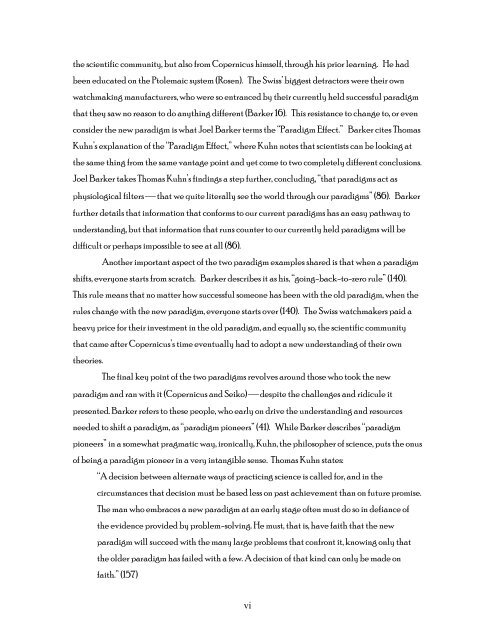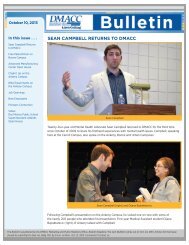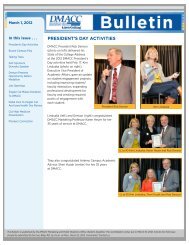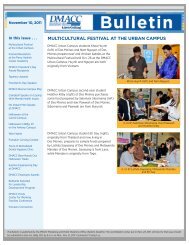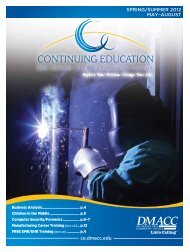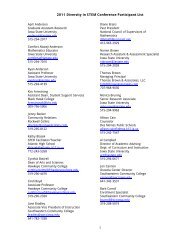The Skunk River Review - DMACC
The Skunk River Review - DMACC
The Skunk River Review - DMACC
You also want an ePaper? Increase the reach of your titles
YUMPU automatically turns print PDFs into web optimized ePapers that Google loves.
the scientific community, but also from Copernicus himself, through his prior learning. He had<br />
been educated on the Ptolemaic system (Rosen). <strong>The</strong> Swiss’ biggest detractors were their own<br />
watchmaking manufacturers, who were so entranced by their currently held successful paradigm<br />
that they saw no reason to do anything different (Barker 16). This resistance to change to, or even<br />
consider the new paradigm is what Joel Barker terms the “Paradigm Effect.” Barker cites Thomas<br />
Kuhn’s explanation of the “Paradigm Effect,” where Kuhn notes that scientists can be looking at<br />
the same thing from the same vantage point and yet come to two completely different conclusions.<br />
Joel Barker takes Thomas Kuhn’s findings a step further, concluding, “that paradigms act as<br />
physiological filters ⎯ that we quite literally see the world through our paradigms” (86). Barker<br />
further details that information that conforms to our current paradigms has an easy pathway to<br />
understanding, but that information that runs counter to our currently held paradigms will be<br />
difficult or perhaps impossible to see at all (86).<br />
Another important aspect of the two paradigm examples shared is that when a paradigm<br />
shifts, everyone starts from scratch. Barker describes it as his, “going-back-to-zero rule” (140).<br />
This rule means that no matter how successful someone has been with the old paradigm, when the<br />
rules change with the new paradigm, everyone starts over (140). <strong>The</strong> Swiss watchmakers paid a<br />
heavy price for their investment in the old paradigm, and equally so, the scientific community<br />
that came after Copernicus’s time eventually had to adopt a new understanding of their own<br />
theories.<br />
<strong>The</strong> final key point of the two paradigms revolves around those who took the new<br />
paradigm and ran with it (Copernicus and Seiko) ⎯ despite the challenges and ridicule it<br />
presented. Barker refers to these people, who early on drive the understanding and resources<br />
needed to shift a paradigm, as “paradigm pioneers” (41). While Barker describes “paradigm<br />
pioneers” in a somewhat pragmatic way, ironically, Kuhn, the philosopher of science, puts the onus<br />
of being a paradigm pioneer in a very intangible sense. Thomas Kuhn states:<br />
“A decision between alternate ways of practicing science is called for, and in the<br />
circumstances that decision must be based less on past achievement than on future promise.<br />
<strong>The</strong> man who embraces a new paradigm at an early stage often must do so in defiance of<br />
the evidence provided by problem-solving. He must, that is, have faith that the new<br />
paradigm will succeed with the many large problems that confront it, knowing only that<br />
the older paradigm has failed with a few. A decision of that kind can only be made on<br />
faith.” (157)<br />
vi


